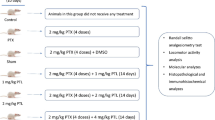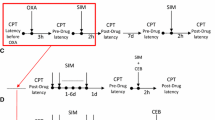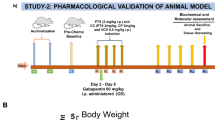Abstract
Paclitaxel use in cancer treatment is limited by a painful syndrome that has no effective treatment. Despite new therapies, drugs of the World Health Organization (WHO) analgesic ladder remain a useful therapeutic tool for cancer pain relief. Since cancer pain is caused by both tumor and chemotherapy, we assessed the efficacy of drugs from the WHO analgesic ladder for cancer pain relief in a paclitaxel-induced pain syndrome (P-IPS) model. P-IPS was induced in rats by one or four injections of paclitaxel on alternate days. The acute and chronic phases were assessed 24 h and 15 days after the first paclitaxel injection, respectively. The mechanical allodynia was evaluated after (step 1 of the ladder) paracetamol, (step 2) codeine alone or plus paracetamol and (step 3) morphine treatment in the acute or chronic phase of P-IPS. Paracetamol, codeine and morphine were equally efficacious in reducing the acute phase of the P-IPS. Codeine plus paracetamol had similar efficacy and potency when administered together in the acute phase of the P-IPS, but produced a longer-lasting effect than when separately managed. Moreover, paracetamol, codeine and morphine partially reduced the chronic phase of P-IPS, losing their efficacy and, in the case of codeine, potency when compared to the acute phase. However, paracetamol plus codeine increased the potency and efficacy of the codeine when compared to codeine administered alone in the chronic phase of P-IPS, producing a long-lasting anti-allodynic effect. Together, analgesics of WHO analgesic ladder reduce both acute and chronic phases of P-IPS, with codeine plus paracetamol presenting more potent, efficacious and long-lasting effect. Thus, in addition to tumor pain, drugs of WHO analgesics ladder could also be useful to treat P-IPS.
Graphic abstract





Similar content being viewed by others
References
Archer J (1973) Tests for emotionality in rats and mice: a review. Anim Behav 21:205–235
Blackburn-Munro G, Bomholt SF, Erichsen HK (2004) Behavioral effects of the novel AMPA/GluR5 selective receptor antagonist NS1209 after systemic administration in animal models of experimental pain. Neuropharmacology 47:351–362
Bray F, Ferlay J, Soerjomataram I, Siegel RL, Torre LA, Jemal A (2018) Global cancer statistics 2018: GLOBOCAN estimates of incidence and mortality worldwide for 36 cancers in 185 countries. CA Cancer J Clin 68:394–424
Burns JW, Aitken HA, Bullingham RES, McArdle CS, Kenny GNC (1991) Double blind comparison of the morphine sparing effect of continuous and intermittent i.m. administration of ketorolac. Br J Anaesth 67:235–238
Chaplan SR, Bach FW, Pogrel JW et al (1994) Quantitative assessment of tactile allodynia in the rat paw. J Neurosci Methods 53:55–63
Cleeland CS, Bennett GJ, Dantzer R, Dougherty PM, Dunn AJ, Meyers CA et al (2003) Are the symptoms of cancer and cancer treatment due to a shared biologic mechanism? A cytokine-immunologic model of cancer symptoms. Cancer 97:2919–2925
Costigan M, Scholz J, Woolf CJ (2009) Neuropathic pain: a maladaptive response of the nervous system to damage. Annu Rev Neurosci 32:1–32
Dalal S, Bruera E (2013) Access to opioid analgesics and pain relief for patients with cancer. Nat Rev Clin Oncol 10:108–116
Dixon JW (1965) The up and down method for small samples. Stat Assoc 60:967–968
Dougherty PM, Cata JP, Cordella JV, Burton A, Weng HR (2004) Taxol-induced sensory disturbance is characterized by preferential impairment of myelinated fiber function in cancer patients. Pain 109:132–142
Dworkin RH, Backonja M, Rowbotham MC, Allen RR, Argoff CR, Bennett GJ et al (2003) Advances in neuropathic pain: diagnosis, mechanisms, and treatment recommendations. Arch Neurol 60:1524–1534
Finnerup NB, Sindrup SH, Jensen TS (2013) Management of painful neuropathies. Handb Clin Neurol 115:279–290
Flatters SJL, Bennett GJ (2004) Ethosuximide reverses paclitaxel- and vincristine-induced painful peripheral neuropathy. Pain 109:150–161
Garrison JA, Mccune JS, Livingston RB, Linden HM, Gralow JR, Ellis GK, West HL (2003) Myalgias and arthralgias associated with paclitaxel. Oncology (Williston Park) 17:271–277
Grond S, Zech D, Schug SA, Lynch J, Lehmann KA (1991) Validation of World Health Organization guidelines for cancer pain relief during the last days and hours of life. J Pain Symptom Manage 6:411–422
Ho ML, Chung CY, Wang CC, Lin HY, Hsu NC, Chang CS (2010) Efficacy and safety of tramadol/acetaminophen in the treatment of breakthrough pain in cancer patients. Saudi Med J 31:1315–1319
Ito S, Tajima K, Nogawa M, Inoue N, Kyoi T, Takahashi Y et al (2012) Etodolac, a cyclooxygenase-2 inhibitor, attenuates paclitaxel induced peripheral neuropathy in a mouse model of mechanical allodynia. J Pharmacol Exp Ther 342:53–60
Jacobson SD, Loprinzi CL, Sloan JA, Wilke JL, Novotny PJ, Okuno SH, Jatoi A, Moynihan TJ (2003) Glutamine does not prevent paclitaxel-associated myalgias and arthralgias. J Support Oncol 1(274):8
Jatoi A, Grudem ME, Dockter TJ, Block MS, Villasboas JC, Tan A, Deering E, Kasi PM, Mansfield AS, Botero JP, Okuno SH, Smith DR, Fields AP (2017) A proof-of-concept trial of protein kinase C iota inhibition with auranofin for the paclitaxel-induced acute pain syndrome. Support Care Cancer 25:833–838
Jiménez-Andrade JM, Ortiz MI, Pérez-Urizar J, Aguirre-Bañuelos P, Granados-Soto V, Castañeda-Hernández G (2003) Synergistic effects between codeine and diclofenac after local, spinal and systemic administration. Pharmacol Biochem Behav 76:463–471
Kanbara T, Nakamura A, Takasu K, Ogawa K, Shibasaki M, Mori T, Suzuki T, Hasegawa M, Sakaguchi G, Kanemasa T (2014) The contribution of Gi/o protein to opioid antinociception in an oxaliplatin-induced neuropathy rat model. J Pharmacol Sci 126:264–273
Kawakami K, Chiba T, Katagiri N, Saduka M, Abe K, Utsunomiya I, Hama T, Taguchi K (2012) Paclitaxel increases high voltage-dependent calcium channel current in dorsal root ganglion neurons of the rat. J Pharmacol Sci 120:187–195
Kehlet H, Dahl JB (1993) The value of ‘‘multimodal’’ or ‘‘balanced analgesia’’ in postoperative pain treatment. Anesth Analg 77:1048–1056
Li JX, Zhang Q, Liang JH (2004) Valproate prevents the induction, but not the expression of morphine sensitization in mice. Behav Brain Res 152:251–257
Listos J, Talarek S, Poleszak E, Wrobel A, Fidecka S (2011) Attenuating effect of adenosine receptor agonists on the development of behavioral sensitization induced by sporadic treatment with morphine. Pharmacol Biochem Behav 98:356–361
Liu X, Tonello R, Ling Y, Gao YJ, Berta T (2019) Paclitaxel-activated astrocytes produce mechanical allodynia in mice by releasing tumor necrosis factor-α and stromal-derived cell factor 1. J Neuroinflammation 16:209
Loprinzi CL, Maddocks-Christianson K, Wolf SL et al (2007) The Paclitaxel acute pain syndrome: sensitization of nociceptors as the putative mechanism. Cancer J 13:399–403
Loprinzi CL, Reeves BN, Dakhil SR, Sloan JA, Wolf SL, Burger KN, Kamal A, Le-Lindqwister NA, Soori GS, Jaslowski AJ, Novotny PJ, Lachance DH (2011) Natural history of paclitaxel-associated acute pain syndrome: prospective cohort study NCCTG N08C1. J Clin Oncol 29:1472–1478
Lynch JJ, Wade CL, Zhong CM, Mikusa JP, Honore P (2004) Attenuation of mechanical allodynia by clinically utilized drugs in a rat chemotherapy-induced neurophatic pain model. Pain 1–2:56–63
Ma W, St-Jacques B, Duarte PD (2012) Targeting pain mediators induced by injured nerve-derived COX2 and PGE2 to treat neuropathic pain. Expert Opin Ther Targets 16:527–540
Markman M, Liu PY, Wilczynski S, Monk B, Copeland LJ, Alvarez RD, Jiang C, Alberts D (2003) Phase III randomized trial of 12 versus 3 months of maintenance paclitaxel in patients with advanced ovarian cancer after complete response to platinum and paclitaxel-based chemotherapy: a Southwest Oncology Group and Gynecologic Oncology Group trial. J Clin Oncol 21:2460–2465
McGrath JC, Lilley E (2015) Implementing guidelines on reporting research using animals (ARRIVE etc.): new requirements for publication in BJP. Br J Pharmacol 172:3189–3193
Mielke S, Sparreboom A, Mross K (2006) Peripheral neuropathy: a persisting challenge in paclitaxel-based regimes. Eur J Cancer 42:24–30
Nair AB, Jacob S (2016) A simple practice guide for dose conversion between animals and human. J Basic Clin Pharma 7:27–31
Okuno SH, Smith DR, Fields AP (2017) A proof-of-concept trial of protein kinase C iota inhibition with auranofin for the paclitaxel-induced acute pain syndrome. Support Care Cancer 25:833–838
Otsubo Y, Satoh Y, Kodama M, Araki Y, Satomoto M, Sakamoto E, Pagès G, Pouysségur J, Endo S, Kazama T (2012) Mechanical allodynia but not thermal hyperalgesia is impaired in mice deficient for ERK2 in the central nervous system. Pain 153:2241–2252
Pachman DR, Barton DL, Watson JC, Loprinzi CL (2011) Chemotherapy-induced peripheral neuropathy: prevention and treatment. Clin Pharmacol Ther 90:377–387
Pascual D, Goicoechea C, Burgos E, Martín MI (2010) Antinociceptive effect of three common analgesic drugs on peripheral neuropathy induced by paclitaxel in rats. Pharmacol Biochem Behav 95:331–337
Pasetto L, D’Andrea M, Rossi E, Monfardini S (2006) Oxaliplatin-related neurotoxicity: how and why? Cri Rev Oncol Hematol 59:159–168
Polomano RC, Mannes AJ, Clark US, Bennett GJ (2001) A painful peripheral neuropathy in the rat produced by the chemotherapeutic drug, paclitaxel. Pain 94:293–304
Quasthoff S, Hartung HP (2002) Chemotherapy-induced peripheral neuropathy. J Neurol 249:9–17
Rahn EJ, Zvonok AM, Thakur GA, Khanolkar AD, Makriyannis A, Hohmann AG (2008) Selective activation of cannabinoid cb2 receptors suppresses neuropathic nociception induced by treatment with the chemotherapeutic agent paclitaxel in rats. J Pharmacol Exp Ther 327:584–591
Reeves BN, Dakhil SR, Sloan JA, Wolf SL, Burger KN, Kamal A, Le-Lindqwister NA, Soor GS, Jaslowski AJ, Kelaghan J, Novotny PJ, Lachance DH, Loprinzi CL (2012) Further data supporting that paclitaxel-associated acute pain syndrome is associated with development of peripheral neuropathy. Cancer 118:5171–5178
Resham K, Sharma SS (2019) Pharmacological interventions targeting Wnt/β-catenin signaling pathway attenuate paclitaxel-induced peripheral neuropathy. Eur J Pharmacol 864:172714
Rigo FK, Dalmolin GD, Trevisan G, Tonello R, Silva MA, Rossato MF, Klafke JZ, Cordeiro MN, Castro Junior CJ, Montijo D, Gomez MV, Ferreira J (2013) Effect of ω-conotoxin MVIIA and Phα1β on paclitaxel-induced acute and chronic pain. Pharmacol Biochem Behav 114–115:16–22
Rodriguez RF, Castillo JM, Del Pilar CM, Nuñez PD, Rodriguez MF, Restrepo JM, Rodriguez JM, Ortiz Y, Angel AM (2007) Codeine/acetaminophen andhydrocodone/acetaminophen combination tablets for the management of chronic cancer pain in adults: a 23-day, prospective, double-blind, randomized, parallel-group study. Clin Ther 29:581–587
Saibil S, Fitzgerald B, Freedman OC, Amir E, Napolskikh J, Salvo N, Dranitsaris G, Clemons M (2010) Incidence of taxane-induced pain and distress in patients receiving chemotherapy for early-stage breast cancer: a retrospective, outcomes-based survey. Curr Oncol 17:42–47
Schug SA, Chandrasena C (2015) Pain management of the cancer patient. Expert Opin Pharmacother 16:5–15
Scripture CD, Figg WD, Sparreboom A (2006) Peripheral neuropathy induced by paclitaxel: recent insights and future perspectives. Curr Neuropharmacol 4:165–172
Sisignano M, Baron R, Scholich K, Geisslinger G (2014) Mechanism-based treatment for chemotherapy-induced peripheral neuropathic pain. Nat Rev Neurol 10:694–707
Vardy J, Agar M (2014) Nonopioid drugs in the treatment of cancer pain. J Clin Oncol 32:1677–1690
Ventafridda V, Tamburini M, Caraceni A, De Conno F, Naldi F (1987) A validation study of the WHO method for cancer pain relief. Cancer 59:850–856
WHO (2018) guidelines for the pharmacological and radiotherapeutic management of cancer pain in adults and adolescents. World Health Organization, Geneva, Licence: CC BY-NC-SA 3.0 IGO
Walker VA, Hoskin PJ, Hanks GW, White ID (1988) Evaluation of WHO analgesic guidelines for cancer pain in a hospital-based palliative care unit. J Pain Symptom Manage 3:145–149
Windebank AJ, Grisold W (2008) Chemotherapy-induced neuropathy. J Peripher Nerv Syst 13:27–46
Woolf CJ, Mannion RJ (1999) Neuropathic pain: aetiology, symptoms, mechanisms, and management. Lancet 353:1959–1964
Xiao W, Naso L, Bennett GJ (2008) Experimental studies of potential analgesics for the treatment of chemotherapy-evoked painful peripheral neuropathies. Pain Med 9:505–517
Zech DF, Grond S, Lynch J, Hertel D, Lehmann KA (1995) Validation of World Health Organization guidelines for cancer pain relief: a 10-year prospective study. Pain 63:65–76
Zimmermann M (1983) Ethical guidelines for investigations of experimental pain in conscious animals. Pain 16:109–110
Acknowledgements
This study was supported by the Conselho Nacional de Desenvolvimento Científico (CNPq; Brasília, Distrito Federal, Brazil) and the Coordenação de Aperfeiçoamento de Pessoal de Ensino Superior (CAPES; Brasília, Distrito Federal, Brazil). SMO is a recipient of a fellowship from CNPq [process #307220/2017-6]. IB is recipient of fellowship from CAPES/PROEX [process #88882.182148/2018-01]. We also acknowledge the receipt of fellowships from CNPq and CAPES.
Author information
Authors and Affiliations
Corresponding authors
Ethics declarations
Conflict of interest
There are no conflict of interest in this manuscript.
Additional information
Publisher's Note
Springer Nature remains neutral with regard to jurisdictional claims in published maps and institutional affiliations.
Rights and permissions
About this article
Cite this article
Pinheiro, K.V., Brusco, I., Hausen, B.S. et al. Efficacy of the World Health Organization analgesic ladder in the paclitaxel-induced pain syndrome in rats. Inflammopharmacol 28, 1677–1689 (2020). https://doi.org/10.1007/s10787-020-00702-w
Received:
Accepted:
Published:
Issue Date:
DOI: https://doi.org/10.1007/s10787-020-00702-w




